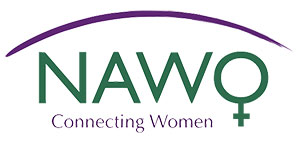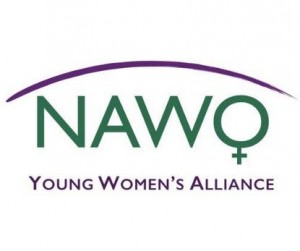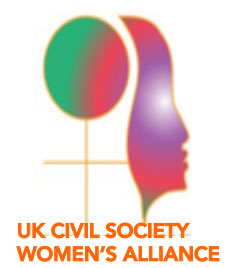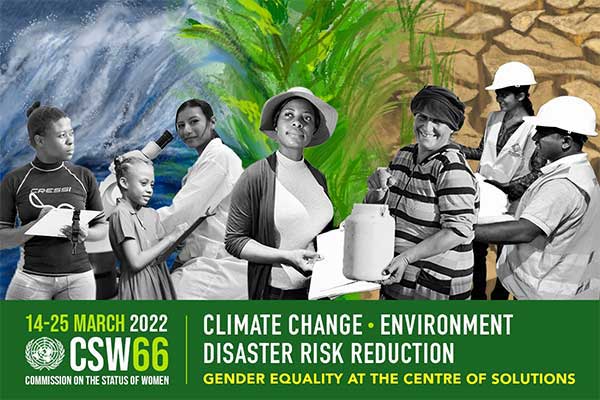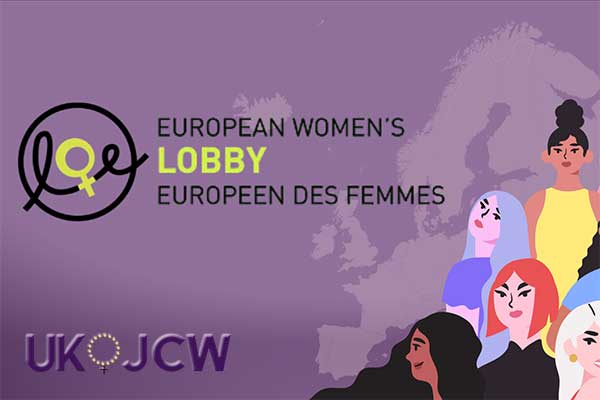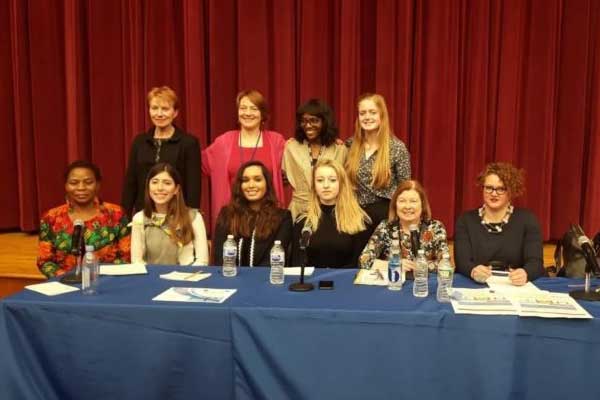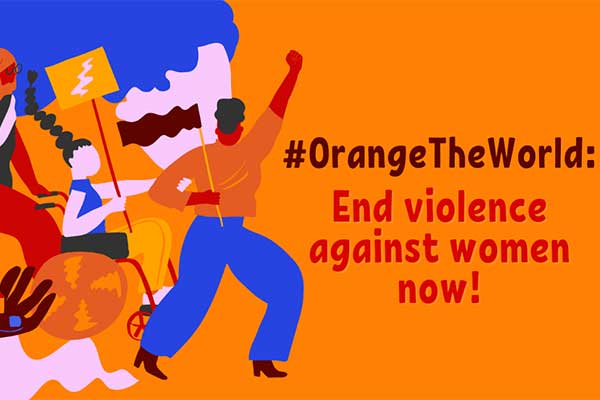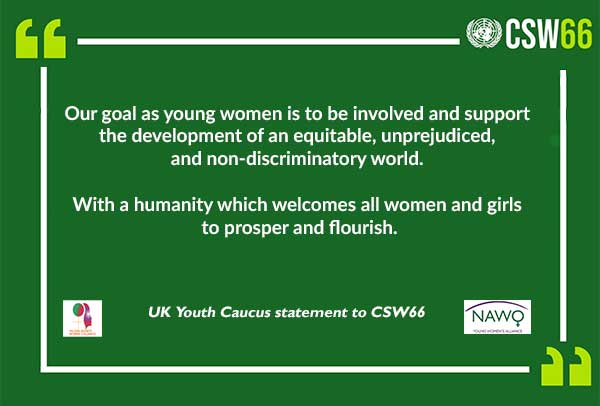
UK Youth Caucus statement to CSW66
As a group of young people from the United Kingdom, we are becoming increasingly aware of the issues involving: the impact of climate change on women and girls; access to education, sanitation, and period poverty; and violence against women in schools and workplaces worldwide.
Through attending CSW66, we aim to learn, contribute and then influence change, supporting the voices of international women and girls. We understand and respect how much has already been accomplished in amplifying the voices and platforms of young girls and women. We believe it is imperative to continue this work. It is vital that girls and young women are supported and encouraged to participate at all levels.
In our statement, we hope to highlight the voices and ideas of young women and girls,share our solutions, providing a platform to those who would not have it otherwise and highlight the importance of involving everyone when deciding and implementing important changes for the future.
Our first concern is the need to achieve gender equality and empowerment of all women and girls in the context of climate change and disaster risk reduction strategies.1
In the Beijing Declaration and Platform for Action2 one of the agreed principal areas of concern is the need for equality for women in power and decision making. There is a need for more women in all planning spaces to combat climate change, especially now, yet only21% of government ministers are women and only 14 countries have achieved 50 percent or more female representation in cabinets.3
Not enough women are involved indecision making at national and international levels especially regarding their rights or allocation of resources for climate change initiatives.
It is important to ensure gender-sensitive investments in programmes for adaptation, mitigation, technology transfer,capacity building and food security all of which are seriously linked to climate change.In regard to the 2030 Agenda and the Sustainable Development Goals4, it is starkly clear to us how vital the input from women and girls can be.
With regards to Goal 135, “To take urgent action to combat climate change and its impacts” Target 13.b6 highlights the need to promote effective climate change planning and management.
We must include women, youth, and local marginalised communities.
Raising the voices of over 20 million women and girls in communities currently under the threat of displacement due to climate change7 and providing support will contribute to improving their livelihoods and ability to adapt.
Although the Beijing Declaration and Platform for Action8 did not include the terminology of climate change, the critical area of concern “women and the environment” presaged the role of women and girls and calls for action to support women and the environment.
As young people who are facing life in a world increasingly impacted by climate change and one in which women and girls are those most affected by it.
It is vital to not only strive for more women to become more involved in decision making but to gain access to land, productive resources and have a voice in environmental planning and management.
Tanya Steele, CEO of WWF UK, in her comments at COP26 and shared by the Women in Climate Action Group concluded:
“Women are not just victims; given the opportunity, they are powerful agents of change.Their leadership is critical as we look to address the huge task ahead of us to stop the destruction of nature and help it recover.” 9We call for accountability of all companies that cause environmental damage, with the implementation of tougher legislation aimed at those who continue to gain profit at the expense of environmental welfare.
All private and public sector entities must improve their inclusivity of women and girls in decision-making protocols – so that the voice of those they are affecting worldwide is heard at the decision-making table.STOP ECOCIDE international is an organisation that is fighting for and raising awareness about ecocide which can be understood as mass damage and destruction of ecosystems committed repeatedly over decades.10
Currently the organisation is campaigning for the Rome Statute of the International Criminal Court (ICC) to be amended for a new fifth edition of ECOCIDE11.
We believe that campaigning and supporting this will contribute significantly to combatting climate change as actions such as oil spills, mineral extraction, and Agent Orange12 will become arrestable crimes and severe environmental harm will become liable to criminal prosecution.
This landmark amendment would encourage greater recognition for climate change and enforce the right actions to become commonplace in all areas of business and industry.The access of women and girls to sanitation and the concern of period poverty worldwide is of grave concern to us.
According to the United Nations Population Fund, period poverty describes the struggles many low-income women and girls face while trying to afford menstrual products.
The term also refers to the increased economic vulnerability women and girls face due to the financial burden posed by menstrual supplies. 13
Period poverty is a global issue affecting women and girls worldwide and we strongly believe that there needs to be a change.
Supplies involve menstrual pads and tampons but should not exclude the additional costs related to pain medication and underwear.
1 in 10 girls in Africa miss school14 as they are unable to afford these supplies.
This results in lasting consequences on their education and future employment, in addition, 500 million women worldwide experience period poverty every week15 forcing them to stay at home, prolonging these consequences on their economic income and inhibiting their future opportunities.
As young females who value our education greatly, we believe that rectifying this current injustice should be of the utmost importance to all global leaders.
On average, women spend 7 years menstruating throughout theirlifetime16, during which time they can experience menstruation-related exclusion,neglect, or discrimination.
Without easy access to such products women are unable to take a variety of jobs.
This impacts females around the world, by prohibiting their ability to progress in society as quickly as males simply due to their genetic makeup.Scotland has introduced the ‘Period Products (Free Provision) Bill,’ putting a legal duty on local authorities to ensure anyone who needs period products can obtain them for free.
Monica Lennon’s aim is for the Bill is to tackle “period poverty,” due to seeing these products as a necessity and believes that providing access to them is important for people’s dignity.17
In addition there should be no tax payable on sanitary products.
Financial support is necessary for the development of environmentally friendly products and to strengthen existing organisations working in this field.
The example of Scotland is one we would like highlighted with other countries developing similar domestic approaches.
The SDGs aspire to achieve gender equality and reduce poverty. We believe this must include abolishing the discrimination and unjust exclusion women and girls face because of period poverty.As young women representing the United Kingdom, we believe that tackling violence against women and girls in education is crucial to ensure young women and girls receive the quality education they deserve.
The Beijing Declaration and Platform for Action18 critical area of concern women and education, acknowledges there should be a commitment towards equality for all women and girls within education and the promotion of gender equality within training, the revision of formal school curricula and policies, and all educational programme support.
59% of young women aged 13-21 say they had faced some form of sexual harassment at school or college in the past year19 and in June 2020 an organisation was founded called ’Everyone Invited’ to combat this20.
They aim to create a space for survivors of sexual assault, rape, or harassment to share their stories in the global eradication of rape culture.
We acknowledge and deeply respect those who have come forward with testimonies, contributing to the ‘Everyone‘s Invited’ movement 21, which is a document that entails over 3,000 schools across the United Kingdom with testimonies of sexual harassment, rape or assault.
We advocate for similar work on an international scale. Many women and girls are not given a safe space to share their experiences, which is why we believe establishing an international forum creating this safe space will encourage and empower women and girls to voice their own stories.We ask for a future where women and girls in all countries have the freedom to access education and a career where they are respected, given a voice and are protected from violence.
The SDGs clearly indicate to us that by 2030 we all need not only equality for all women and girls in education, but decent work and economic growth. 22
Target 8.8 of the SDGs highlights the need to promote safe and secure working environments for all.
We would like to highlight the recent and ongoing setbacks to education due to the coronavirus pandemic which has heavily affected Goal 423; aimed to ensure quality education and promote lifelong learning opportunities for all. By improving early years education we will see long term benefits in developing equality in workplaces on an international scale.
In addition we ask all Member States to fund quality education to ensure all girls receive education till the age of 18.
In countries where quality education is available this is not translated into careers on a par with male counterparts. We call on Member States to address this.In summary we ask Member States, Civil Society and others to take stronger action on the issues highlighted in this statement: access to education, sanitation, period poverty;and violence against women and girls in schools and workplaces worldwide.
Evidently the issues mentioned here are not in exclusion of many other prevalent concerns we have.
We want to stress how bringing more women into decision making will improve the equality and inclusivity of solutions we have highlighted throughout our statement such as criminalising climate change offenders, eradicating period poverty, improving access to education and eliminating violence and harassment in the workplace.
We urge everyone to provide and continue to expand youth participation in all decision making spaces to help ensure all the SDGs are achieved.
Not only merely achieved, but going beyond tick box minimal compliance to ensuring thriving and progressing communities.Our goal as young women is to be involved and support the development of an equitable, unprejudiced, and non-discriminatory world with a humanity which welcomes all women and girls to prosper and flourish.
Edited by Kate Evans and Sophie Newport NAWO YWA
DOWNLOAD STATEMENT (PDF)
References
1 Commission on the Status of Women | UN Women – Headquarters
2 PFA_E_Final_WEB.pdf (unwomen.org)
3 Reference: Inter-Parliamentary Union and UN Women (2020). Women in politics 2020map. https://www.unwomen.org/en/what-we-do/leadership-and-political-participation/facts-and-figures
4 THE 17 GOALS | Sustainable Development (un.org)
5 https://sdgs.un.org/goals/goal13
6 https://www.un.org/ga/search/view_doc.asp?symbol=A/RES/70/1&Lang=E Secretariat: NAWO, Wixamtree, 28 Sand Lane, Northill ,Biggleswade, Beds SG18 9AD
7 https://www.wen.org.uk/wp-content/uploads/Why-women-and-climate-change-briefing-2.pdf
8 The Beijing 12 critical areas of concern deconstructed | UN Women – Headquarters
9 Tanya Steele, CEO, WWF UK – COP26 – women excluded in fight against climate change – Aviva plc
10 What is ecocide? — Stop Ecocide International
11 Making ecocide a crime — Stop Ecocide International
12 Exposure to Agent Orange, a case of “ecocide”, Vietnam | EJAtlas
13 https://www.unfpa.org/menstruationfaq#Period%20Poverty
14 Period Poverty, Stigma Are Keeping Girls Out of School (globalcitizen.org)
15 Period Poverty – A Global Crisis – WIIS | Women In International Security (wiisglobal.org)
16 https://www.unicef.org/press-releases/fast-facts-nine-things-you-didnt-know-about-menstruation#:~:text=On%20average%20a%20woman%20menstruates%20for%20about%207%20years%20during%20their%20lifetime.
17 https://www.parliament.scot/bills-and-laws/bills/period-products-free-provision-scotland-bill
18 https://www.unwomen.org/en/news/in-focus/csw59/feature-stories#education
19 #MeToo at School (endviolenceagainstwomen.org.uk)
20 https://www.everyonesinvited.uk/
21 https://static1.squarespace.com/static/5f22a93a4ca3bd10e8148771/t/60c12c3a95190e 381ee755a6/1623272508283/EI+-+Primary+and+Secondary+School+Names.pdf
22 https://sdgs.un.org/goals/goal8
23 Goal 4 | Department of Economic and Social Affairs (un.org)
